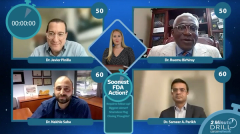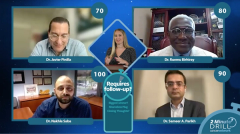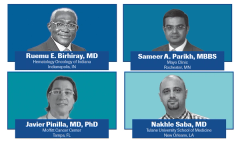
2-Minute Drill: FDA Action-Worthy Trials From the 2023 ASCO Annual Meeting
Thought leaders from various institutions offered their take on the trial they think may lead to the next FDA approval following data that were presented at the 2023 ASCO Annual Meeting.
Episodes in this series

Following the 2023 ASCO Annual Meeting, Ruemu E. Birhiray, MD, Hematology Oncology of Indiana; Sameer A. Parikh, MBBS, Mayo Clinic; Javier Pinilla, MD, PhD, Moffitt Cancer Center; and Nakhle Saba, MD, Tulane University School of Medicine, discuss the trial they think may lead to the next FDA approval following data that were presented at the meeting.
The participants had 1 minute each to give their response.
Kahl: All right, next topic, 1 minute each. So we just heard about the most practice changing but before all of that, what trial is going to lead to the next FDA approval the soonest following ASCO? Dr. Birhiray, we'll start with you.
Birhiray: So I want to actually change from blood cancers to breast cancer. I think the one [trial] that will lead to the earliest approval, I suspect it's going to be the ribociclib (Kisqali) trial in the treatment of breast cancer, because that is a trial where a CDK4/6 inhibitor [was] added to stage II/stage III breast cancers [and] resulted in about a 30% improvement in disease-free [survival and] about a 25% improvement in invasive-disease-free survival. There was a small trend towards survival benefit. The study is still small. It does have some weaknesses, though. One of the weaknesses was that the study required 3 years of BTK inhibitor [treatment] instead of 2 years like with abemaciclib (Verzenio). Another potential weakness is the fact that the study did not include minority patients, as you would expect, I think that was even reported. I was told about 100 minority patients in a 5000-patient study.
Kahl: Oh, just in the nick of time on that one. Alright, 30 points. Dr. Pinilla, we'll shoot it over to you.
Pinilla: I don’t really see [anything] coming in strong. I saw that we got approval of epcoritamab (Epkinly) is an excellent subcutaneous [therapy] I saw attractively. in this high-risk population of follicular (lymphoma). And I thought that maybe in the future, we're going to have this approval. But I personally don't see anything really coming back. I think we see the long-term [therapeutic] that is coming in CLL independently of any data that has been present. The BRUIN CLL-321 is not being presented here. But we have the long-term data in mantle cell lymphoma that continues to really show some really interesting data. But I personally don't really see any soon approvasl in the area of lymphomas.
Kahl: Okay, we'll go 20 points there. Dr. Saba?
Saba: I totally forgot about glofitamab [to treat adult patients with relapsed or refractory large B-cell lymphoma after 2 or more lines of systemic therapy]. I believe [the PDUFA date is] July 1. The trial was presented, and there was nothing new. I believe they had a poster and fit had a long-term benefit. That was 18 months for durable responses, despite the fixed duration of glofitamab of 12 months. And as you said epcoritamab was just approved a few weeks ago. And that's the natural competitive now for glofitamab. While epcoritamab is a lifelong commitment, glofitamab is a fixed duration. I think this is one of the main issues that goes to when people are going to use these drugs in between.
Kahl: Absolutely 40 points. Doctor Parikh, close this out on this one.
Parikh: So I'm going to go with glofitamab as well. As Dr. Saba mentioned, and I also think, at least for CLL, I think for 2 groups, you know, will likely receive approval. I think, you know, like Dr. Pinilla mentioned, there was no new data presented. I think there was a couple of posters talking about long-term safety with excellent follow-up for ibrutinib [Imbrivca]. And so I think those continue to look good. And I suspect that much like mantle cell lymphoma, ibrutinib will likely will gain approval for relapse CLL.
Kahl: Absolutely, 30 points.
Transcription edited for clarity.
Newsletter
Stay up to date on recent advances in the multidisciplinary approach to cancer.











































